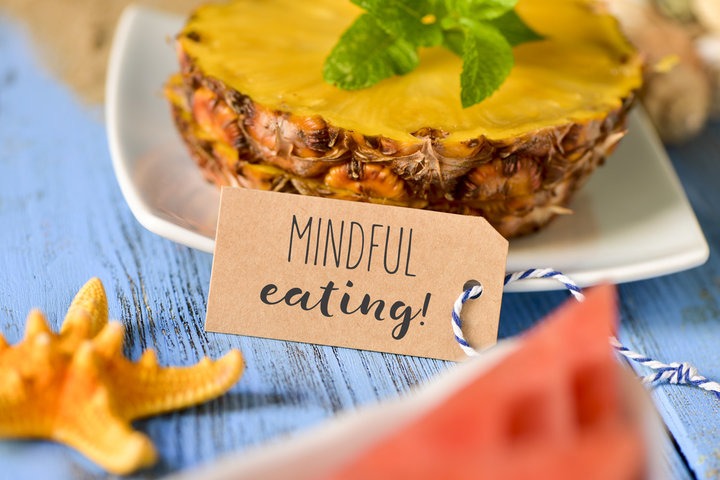Mindful Eating: Nourishing Your Relationship with Food and Yourself
HEALTH AND WELLNESS
Tarun Mehta
5/2/20254 min read


Mindful Eating: Nourishing Your Relationship with Food and Yourself
In today’s world of fast food, 10-minute lunches, and endless scrolling while snacking, we have lost touch with the simple joy of eating. Mindful eating - a practice not about strict diets or calorie counting, but about reconnecting with food, savoring every bite, and understanding your body’s needs, is simple yet powerful tool that can transform the way you relate to your food and create a long-lasting and positive changes to you health.
Whether you are looking to lose weight, improve digestion, reduce stress, or simply feel better in your body, mindful eating can be a game-changer. Here is how to start - and stick with - a more intentional and nourishing way of eating.
What Is Mindful Eating?
Mindful eating is the practice of being truly present and engaged with your food during meals. It involves slowing down, tuning into your senses, and paying close attention to your body’s hunger and satiety cues. It draws from the principles of mindfulness - awareness, presence, and non-judgment, and applies them directly to how you engage with food.
Rather than eating on autopilot, mindless munching through bags of chips or multitasking during dinner, mindful eating invites you to press pause, breathe, and savor.
Why Mindful Eating Matters
Before diving into how, let us look at why this matters:
Break free from emotional eating: Learn to distinguish between physical hunger and emotional cravings.
Improve digestion: Slowing down your meals helps your digestive system function more efficiently.
Regulate portions naturally: You are more likely to stop eating when full if you are paying attention.
Reduce guilt and stress around food: Mindful eating promotes a non-judgmental approach.
Rediscover the joy of eating: Food becomes a source of nourishment and pleasure, not shame or stress.
How to Start Eating Mindfully: 8 Action Steps
1. Eat Without Distractions
Put down the phone. Turn off the TV. Close the laptop.
Start by creating a meal space free of screens and distractions. This allows you to focus on the food that is in front of you – its taste, texture, aroma, and your body’s response to it.
Action Step: Dedicate one meal a day to “screen-free” eating. Start with lunch or dinner, whichever is easier.
2. Take a Moment Before You Eat
Pause before your first bite. Take a deep breath. Express silent gratitude for the food on your plate. This moment of stillness can ground you and create a deeper connection with your meal.
Action Step: Create a 10-second ritual before eating - inhale, exhale, say thank you, or just observe your plate.
3. Chew Slowly and Thoroughly
Digestion begins in the mouth. Chewing slowly allows you to actually taste the food better and also improves digestion. You might be surprised how much more enjoyable your meals become when you are not racing through them.
Action Step: Try the “20-chew rule.” Aim to chew each bite at least 20 times before swallowing.
4. Listen to Your Body's Cues
Your body speaks in subtle cues. Learn to distinguish between true physical hunger, emotional triggers, and the feeling of fullness. You do not have to clean your plate. You also do not have to wait until you are starving to eat.
Action Step: Before eating, ask yourself, “Am I truly hungry or just bored/stressed/tired?” After eating, rate your fullness on a scale of 1-10.
5. Identify Emotional Triggers
Food often becomes a coping mechanism. Mindful eating promotes awareness of our emotions without any judgment. When you feel the urge to eat, pause and reflect on what is really going on.
Action Step: Keep a food + mood journal. Write down what you eat, when, and how you felt before and after.
6. Simplify Your Meals
You do not need gourmet meals to practice mindfulness. Simple, whole foods like a bowl of fresh fruits, a plate of steamed vegetables, or a serving of whole grains are easier to connect with. Complex recipes or rushed takeout meals can add to overwhelm.
Action Step: Plan one homemade, nourishing meal per day - even a simple soup or salad counts.
7. Engage All Your Senses
Mindful eating is a full sensory experience. Notice the colors, aromas, textures, and flavors. The crunch of a carrot. The warmth of soup. The spice in a curry. The sweetness of a ripe mango.
Action Step: Choose one meal a day to fully experience through all five senses. Try describing each bite in your mind.
8. Practice Compassion, Not Perfection
You will not eat mindfully every single time - and that is okay. This is a lifelong practice, not a rigid rule. The goal is progress, not perfection.
Action Step: At the end of each day, reflect: “Did I eat with awareness at least once today?” Celebrate that win.
Mindful Eating: What Changes When You Stay Consistent?
By practicing mindful eating, here is what you might begin to notice over time:
You stop overeating because you notice when you are full.
You enjoy food more and feel less deprived.
Your cravings shift - you naturally gravitate toward nourishing foods.
You feel calmer and more in control during meals.
You build a deeper, more respectful relationship with your body.
The transformation you will experience is not just physical, it also nurtures your emotional and spiritual health. Mindful eating reconnects you to your body’s wisdom, your food’s origin, and the present moment.
Mindful Eating: Overcoming Common Challenges
“I Don’t Have Time” - Start small. Even two minutes of mindful eating is better than none. You can build from there.
“I Always Forget” - Set a reminder or sticky note on your fridge or phone. Habit stacking (pairing it with something you already do) helps too.
“I Feel Silly Doing This” - New practices always feel awkward at first. Trust the process. The more you will practice it, the more natural it will become.
The Takeaway: Small Steps Lead to Big Shifts
You do not have to overhaul your diet overnight. You do not need fancy superfoods or strict rules. Mindful eating is a flexible practice that allows you to show up with awareness, one meal at a time, one breath at a time, one bite at a time. That is all it takes to begin building a healthier, more peaceful relationship with food.
Mindful eating is not a trend. It is a return to something ancient and wise: honoring your body, respecting your food, and being present with each bite. And when you bring mindfulness to the table, everything changes, and for the better.
Now it is your turn:
Which action step will you try first? Let this be the beginning of a more nourishing journey - one bite at a time.
Video available at: https://youtu.be/l59lC8wDa-s

Ascend2Elevate
Transform today, Thrive tomorrow
© 2026. All rights reserved.
PS: The content on the website are the author's viewpoint and opinion. Kindly follow any tips or advice at your own discretion and ensure they suit your needs and personal situation. Please check our T&C page for more details (ascend2elevate.com.au/terms-and-conditions)
Office 4074, Ground Floor, 470, St Kilda Rd, Melbourne, VIC-3004, Australia
